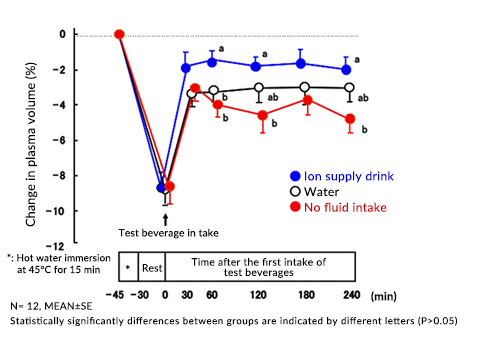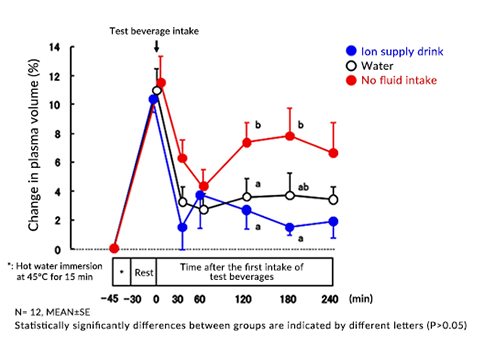Rehydration after bathing:
Comparison between a carbohydrate-electrolyte beverage and water
Tadano K, Sakurai M, Shimizu M, Noda T, Hamada K, Morimoto T, Tadano J
Medicine and Biology 2010; 154: 376-386
Purpose
We studied whether an ion supply drink was more effective than water for recovering from dehydration and increased blood viscosity induced by bathing.
Method
Twelve healthy male subjects were studied in three randomized cross-over intervention trials using an ion supply drink, water, and a control condition without fluid intake. After the subjects took a bath in hot water at 41℃ for 15 minutes, they rested in a room with an ambient temperature of 27.8℃ and 38.0% relative humidity for 30 minutes. After resting for 30 minutes, they ingested test beverages equal to their body weight loss. The changes in the properties of their blood were measured after the subjects ingested the test beverages.
Results
Approximately 800ml of body water was lost by bathing in hot water at 41℃ for 15 minutes and resting for 30 minutes. The recovery of the plasma volume observed with the ion supply drink was significant at 60 minutes in comparison to the water, and at 60, 120, and 240 minutes of the recovery period in comparison to when there was no fluid intake. The blood viscosity with the ion supply drink was significantly lower than that in the case of no fluid intake at 120 and 180 minutes.
Conclusion
The ion supply drink was more effective than water for restoring the plasma volume. Additionally, the ingestion of an ion supply drink may suppress an increase in blood viscosity after bathing-induced dehydration.










